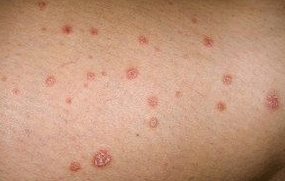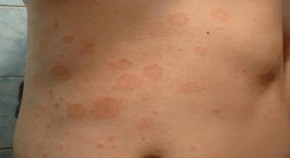What is psoriasis and what does it seem?Psoriasis is an uninfective skin condition, from which the result of red inflammatory plates, as well as dry scales - result of excessively fast-growing leather cell growth.The disease most often affects the skin on the elbows, knees and scalp.
In some people, it is manifested in mild form, symptoms are practically absent.Others record heavy symptoms, frequent relapses.What is Psoriasis from where it comes from, why it appears, the causes of appearance, how they get infected - we will try to answer these and other questions on our portal pages.

Psoriasis is incurable, long-berm (chronic) skin condition.The worsening phases are quickly replaced by the improvement phases.Many patients record the deterioration of the symptoms from November to February (winter months), as well as in hot summer time.Psoriasis affects all ethnic races and representatives of both sexes.Although psoriasis can occur in people of any age - from baby to older people - most often disease is diagnosed in adolescence under 20 years.
At what age does psoriasis appear?The disease is rare in newborns (less than 4% of the sick), in children, psoriasis can manifest if the parents are a disease carrier.Psoriasis in such small children often precedes acute faryngitis, tonsilitis, bronchitis or respiratory infection, for example, cold, flu or pneumonia.People with psoriasis have more chances of getting diabetes, hyperlipidemia, as well as heart disease.
Why does psoriasis occur?The causes of psoriasis are unknown to the end, but usually a disease is associated with the problem of the immune system.What does psoriasis appear from?The key element is a special type of lymphocytes, called T-lymphocytes or T cells.As a rule, these white blood cells move around the body to reveal and eliminate foreign substances, such as viruses or parasites.However, in patients with psoriasis, T-lymphocytes are wrongly attacking healthy skin cells (for the fight against false infection).
Hyperactive lymphocytes cause immune reactions, including spreading and increasing vessels around the papulus and pashi pustula.These changes lead to increased production and healthy skin cells and other white blood cells.This causes a liquid cycle, against which new skin cells are too fast too fast to the upper layers of the epidermis - in the day.
Researchers also found genes associated with psoriasis, proving that the disease is inherited, but ecological external factors (physical, chemical, heat effect) and internal (stress, infatuated nutrition, overex and sleeping, infection, excessive / regular use of alcohol and smoking) also play a role.
Signs and symptoms
Psoriasis is manifested in the form of red or pink hesicated cones that connect to large papules (plaques) of the skin.Sometimes, when combing these small dry white scales, there is light bleeding.
There are several types of psoriasis - not pustula (affects large skin surfaces) and pustules (more rare shapes, usually manifested in arms or legs).The rash can have different outlines and shapes - from points and rocky to monetary visible.
The first signs of psoriasis are an increased fatigue, weakness throughout the body, sometimes a small dizziness, general malaates.As the rash develops and increases, symptoms such as itchy, ignition, pain, sometimes adding fever, cold.
Phase
In the absence of treatment, psoriasis develops quite fast.At the initial phase, small pink or reddish scales appear on the skin (which is usually symmetrically, for example, on both hands, places will be in the same way).Furthermore, at the top of a reddish spot, it begins to develop a scaly surface layer.

This is a kerratinized skin that is easily removed on its own.After the formation of the scales, reddish spots gather in large red plabakes, this phase follows a strong itching and ignition, as well as skin peeling.
Deterioration
The worsening phase characterizes the appearance of large (often swollen) stains on the skin (plaque, dad), difficult itching, ignition, often pain.The area of spreading the disease is also increasing (plaques become more than 10 cm in diameter).A distinctive sense of skin tightening appears.When moving the disease, you should immediately contact the drive.During this phase, cracks appear on the skin (due to impermeability, dryness and keratinization).
Danger to live
During the worsening phase, keratized dry areas shoot, leather begins to bleed and become more sensitive to infections, causing the appearance of new plaques (Köbner syndrome).
The hardest consequence of deterioration can be psoriatic arthritis (the disease will expand to bones and joints and cause their inflammation and deformation) or psoriotic erytroderma (very difficult incurable skin disease) that can lead to death.
Psoriasis is still one of the most complex skin diseases.A wide range of procedures available for the treatment of psoriasis illustrates this.It is very important to take measures to refrain from disease and prevent the departure in the deterioration phase, it is necessary to seek help experts, as well as changing your lifestyle, turn to drugs and traditional medicine methods.























